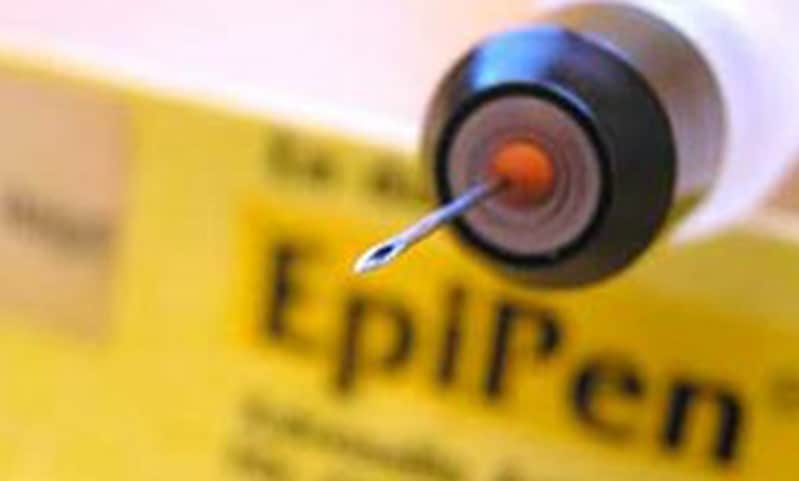Many people trust epinephrine injectors to protect them against serious allergic reactions. It now appears this trust might have been misplaced.
The company largely blamed product misuse for the EpiPen injector problems.
The failure to release a safety catch and injecting the chemical at the wrong angle might cause either too much or too little epinephrine to enter the body.
Customers also reported problems pulling the EpiPen injector out of its protective sleeve. In these cases, a few milliseconds could make an enormous difference.
Finally, Pfizer admitted that EpiPen injectors do not work properly if the patient does not inject for a full three seconds or uses an injection site other than the thigh.
Pfizer manufacturers these EpiPen injectors, and Mylan Pharmaceuticals sells them.
Auto-Injector Use
Epinephrine is a chemical that almost instantly opens the airways and constricts blood vessels. So, immediate epinephrine injections (like Pfizer EpiPen Injector) usually prevent anaphylaxis, or a severe allergic reaction to foods, bug bites, and other allergens.
Anaphylaxis is a very rare condition, but it is extremely scary, for both the people who suffer from this condition and those around them.
When the person comes into contact with an allergen, life-threatening symptoms appear almost instantly, such as:
- Hives or other skin reactions,
- Hypotension (extremely low blood pressure),
- Tongue swelling, which creates trouble breathing, and
- Arrhythmia (irregular heartbeat).
Epinephrine does not “cure” anaphylaxis. However, the chemical slows the body’s immune response, so the person can seek medical help.
People with severe allergies to food or medicine should always carefully read labels, keep emergency kits on them, and wear medical alert necklaces or bracelets.
Responsibility for Defective Products
Generally, manufacturers are strictly liable for any injuries their defective products cause. The defect could be either of the following:
- Manufacturing Defect: The Takata airbag debacle is a good example of a manufacturing defect. Takata airbags have saved thousands of lives. But in the late 90s, executives replaced the reliable, and expensive, chemical propellant in these airbags with explosive ammonium nitrate. That’s the same compound terrorist Tim McVeigh used in the Oklahoma City truck bomb. The results were tragic.
- Design Defect: The 1970s Ford Pinto was defective the moment it appeared on the drawing board. To save money and weight, designers placed the fragile gas tank behind the rear axle. As a result, the gas tank often collapsed and exploded, especially in high-speed crashes.
Companies are also strictly liable for injuries which occur during ultrahazardous activities, such as toxic waste disposal.
Strict liability applies if there was a high probability of serious harm, no amount of care could eliminate the risk, and the activity’s potential harm outweighed the activity’s benefit for the community.
Alternatively, our New York defective product attorneys often pursue public nuisance claims.
These claims are available if the company’s product or activity harmed a significant number of people in basically the same way.
The Product Misuse Defense
Generally, this defense is the only available response in defective product claims.
Much like comparative fault in a car crash case, product misuse shifts blame for the accident from the company to the victim.
In some cases, the defense is inapplicable, companies have a duty to foresee reasonable misuse and take appropriate steps.
There is no real consensus on what constitutes a “foreseeable” misuse.
Shaking a vending machine is a good example.
Some courts have held that companies should anticipate that people might violently shake these machines to obtain free product. Other courts have reached the opposite conclusion.
Additionally, the product misuse must be off the rails.
Injecting a chemical at the wrong angle or with the wrong amount of force does not constitute product misuse, in this context.
Instead, the victim must do something completely unreasonable, like use a flamethrower to kill a housefly.
Damages in a Defective Product Case
Compensation in defective product cases is usually quite substantial. In addition to compensatory damages for things like medical bills and pain and suffering, many victims are entitled to additional punitive damages.
Frequently, the company knows about the product’s defect yet does nothing to correct the situation. This behavior is especially common in pharmaceutical claims.
Companies do not want to do anything which might adversely affect sales.
Punitive damages punish such reckless conduct.
Unless the court awards significant punitive damages, many companies simply write off the loss and continue doing business as usual.
As a result, future victims might experience the same injuries.
When it comes to defective products, companies routinely place profits before people. For a free consultation with an experienced New York personal injury attorney, contact Napoli Shkolnik PLLC. You have a limited amount of time to act.
